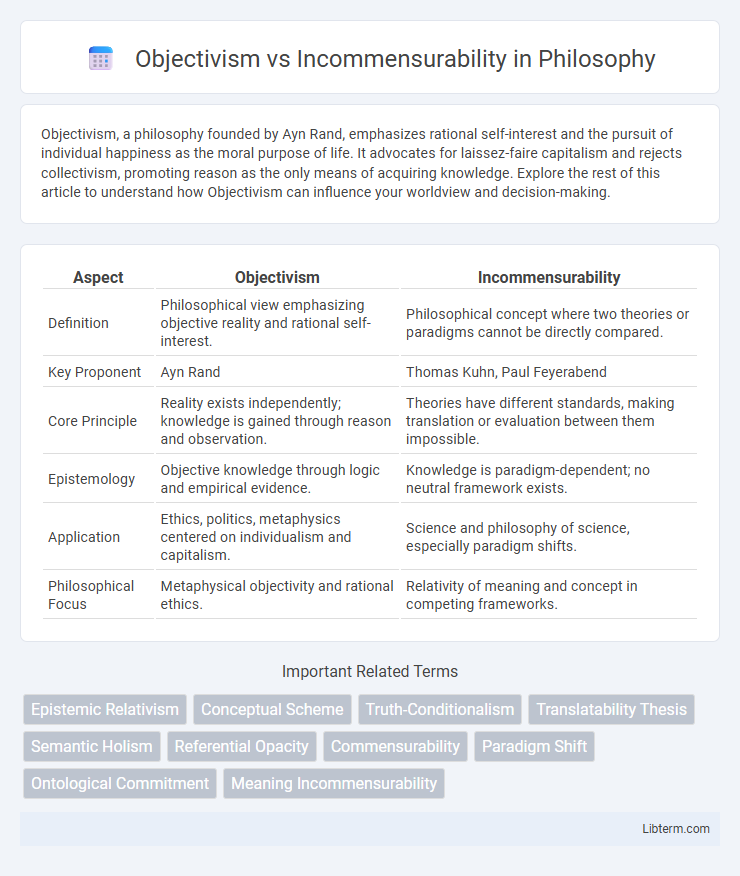Objectivism, a philosophy founded by Ayn Rand, emphasizes rational self-interest and the pursuit of individual happiness as the moral purpose of life. It advocates for laissez-faire capitalism and rejects collectivism, promoting reason as the only means of acquiring knowledge. Explore the rest of this article to understand how Objectivism can influence your worldview and decision-making.
Table of Comparison
| Aspect | Objectivism | Incommensurability |
|---|---|---|
| Definition | Philosophical view emphasizing objective reality and rational self-interest. | Philosophical concept where two theories or paradigms cannot be directly compared. |
| Key Proponent | Ayn Rand | Thomas Kuhn, Paul Feyerabend |
| Core Principle | Reality exists independently; knowledge is gained through reason and observation. | Theories have different standards, making translation or evaluation between them impossible. |
| Epistemology | Objective knowledge through logic and empirical evidence. | Knowledge is paradigm-dependent; no neutral framework exists. |
| Application | Ethics, politics, metaphysics centered on individualism and capitalism. | Science and philosophy of science, especially paradigm shifts. |
| Philosophical Focus | Metaphysical objectivity and rational ethics. | Relativity of meaning and concept in competing frameworks. |
Introduction to Objectivism and Incommensurability
Objectivism centers on the belief that reality exists independently of perception, advocating for objective knowledge through reason and evidence. Incommensurability refers to the idea that certain scientific theories or paradigms are so radically different in concepts and methods that they cannot be directly compared or measured against each other. The tension between Objectivism's pursuit of absolute truth and the concept of Incommensurability challenges the possibility of universal standards for evaluating competing knowledge claims.
Defining Objectivism: Key Concepts and Principles
Objectivism centers on the belief that reality exists independently of human perceptions and that objective knowledge is achievable through reason and empirical evidence. Key principles include the primacy of existence, the law of identity, and the rejection of relativism, emphasizing that facts remain constant regardless of subjective interpretation. This philosophical framework contrasts with incommensurability by asserting that concepts and theories can be objectively compared and evaluated based on a shared reality.
Understanding Incommensurability in Philosophy
Incommensurability in philosophy refers to the idea that certain concepts or theories cannot be directly compared or measured against each other due to fundamental differences in their underlying frameworks or criteria. This challenges Objectivism, which asserts that knowledge and truth are objective, universal, and independent of individual perspectives. Understanding incommensurability highlights the limitations of strict objectivist approaches by emphasizing the contextual and paradigm-dependent nature of meaning and truth in philosophical discourse.
Historical Background and Philosophical Roots
Objectivism, rooted in Ayn Rand's philosophy developed in the mid-20th century, asserts that reality exists independent of consciousness and that individuals can gain objective knowledge through reason. Incommensurability arises from Thomas Kuhn's and Paul Feyerabend's critiques in the 1960s, highlighting how distinct scientific paradigms resist direct comparison due to differing concepts, methodologies, and standards. The philosophical roots of Objectivism trace back to Aristotelian realism and Enlightenment rationalism, while incommensurability is grounded in post-positivist philosophy of science and linguistic relativity.
Objectivism: The Pursuit of Universal Truths
Objectivism centers on the belief that universal truths exist independent of individual perspectives or cultural contexts, emphasizing objective reality as the foundation for knowledge and ethics. It argues that rational inquiry and empirical evidence can uncover these absolute truths, enabling consistent moral and epistemological frameworks. This pursuit challenges relativistic views like incommensurability, which propose that knowledge systems are fundamentally incomparable and context-dependent.
Incommensurability: The Challenge of Paradigm Differences
Incommensurability highlights the challenge of paradigm differences by emphasizing that competing scientific frameworks often lack a common measure, making direct comparison difficult or impossible. This concept underlines how researchers within distinct paradigms use divergent languages, methodologies, and standards of evidence, leading to fundamentally different interpretations of data. The incommensurability problem challenges Objectivism's assumption of objective, neutral truth by showing that knowledge is paradigm-dependent and context-sensitive.
Points of Convergence and Divergence
Objectivism asserts that truths exist independently of perception, emphasizing universal standards and objective knowledge, while incommensurability highlights the inability to compare or translate between distinct conceptual frameworks due to fundamental differences. Both perspectives acknowledge challenges in understanding or communicating knowledge across paradigms, yet objectivism seeks a definitive truth applicable universally, whereas incommensurability stresses the context-dependent, non-overlapping nature of competing systems. This divergence centers on whether a shared metric for truth is possible, with convergence found in their recognition of epistemological complexity and limits in knowledge evaluation.
Impacts on Scientific Progress and Knowledge
Objectivism in science emphasizes the existence of universal truths and objective standards, facilitating cumulative knowledge and steady scientific progress through shared frameworks and reproducible results. In contrast, the concept of incommensurability, introduced by philosophers like Thomas Kuhn, highlights the difficulty of comparing different scientific paradigms due to fundamentally incompatible concepts and languages, which can disrupt consensus and slow the integration of new knowledge. These contrasting views impact scientific progress by either promoting a unified, objective accumulation of knowledge or by recognizing paradigm shifts that challenge existing frameworks and reshape understanding.
Contemporary Debates and Perspectives
Contemporary debates on Objectivism versus Incommensurability center on whether universal truth criteria can reconcile conflicting knowledge systems or whether some epistemologies are fundamentally incomparable. Objectivism argues for objective standards rooted in logic and empirical evidence, while proponents of Incommensurability highlight the contextual and cultural boundaries that prevent meaningful translation between paradigms. Recent discussions explore the implications for cross-disciplinary research, ethics, and international discourse, emphasizing nuanced positions that challenge strict dichotomies.
Conclusion: Navigating Objectivity and Relativism
Navigating objectivity and relativism requires acknowledging that Objectivism champions universal truths accessible through reason, while the concept of incommensurability highlights the difficulty of comparing fundamentally different paradigms or value systems. Embracing a nuanced approach involves recognizing objective standards where applicable, yet remaining open to contextual interpretations that prevent rigid absolutism. This balance fosters critical dialogue and intellectual humility across diverse epistemological frameworks.
Objectivism Infographic

 libterm.com
libterm.com